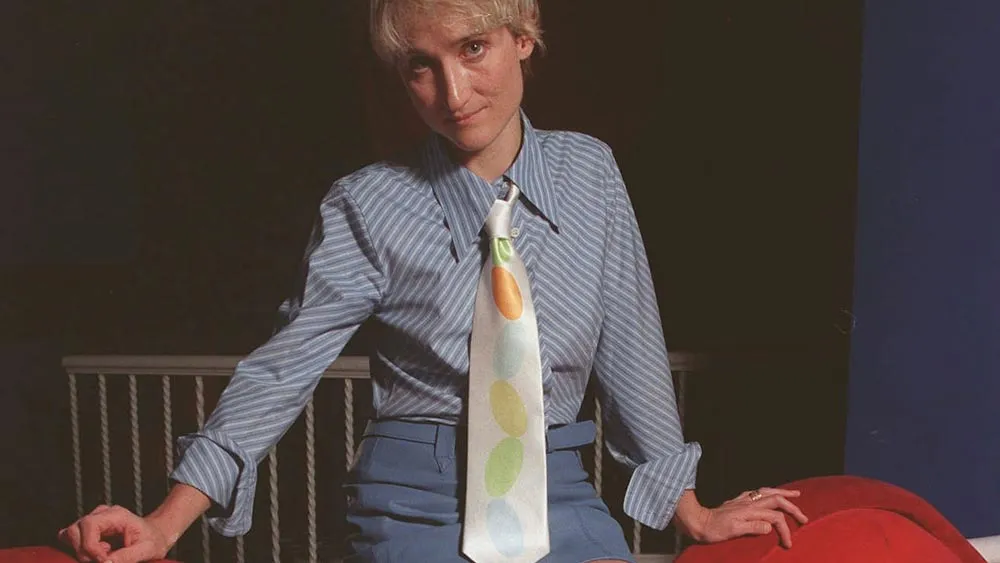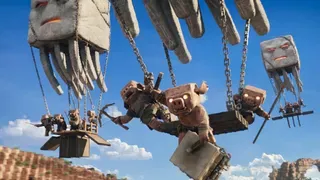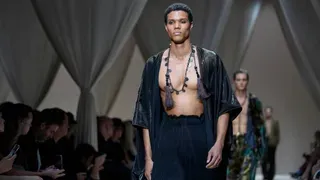April 2, 2012
New Zealand director Taiki Waititi makes his mark with 'Boy'
Jake Mulligan READ TIME: 9 MIN.
He may not be a household name yet, but Taika Waititi is poised to become one of the most exciting talents in film comedy today.
After being nominated in 2003 for an Oscar for his short film "Two Cars, One Night," Waititi turned heads with both his debut feature "Eagle vs. Shark" and writing and directing episodes of the cult classic TV show "Flight of the Conchords." Variety picked him as one of the "ten new directors to watch in 2007." Last summer he appeared in the film "The Green Lantern" and, more recently, directed episodes of the hit New Zealand series "Super City" starring New Zealand music/comedy icon Madeleine Sami.
But it is his film "Boy" (opening now in limited theaters) that truly solidifies him as a must-watch filmmaker. The film, a coming-of-age story about a young adolescent who's forced to make terms with the sudden reappearance of his even more immature father (played by Waititi himself), is earnest, zany, and altogether beautiful. The New Zealand film scene may not be one of the most prolific, but Waititi is trying his best to change that.
And he's starting by going on a press tour with "Boy," which is finally opening over two years after it premiered to rave reviews at the Sundance Film Festival. After an incredibly awkward Q+A session after a screening at Boston's Kendall Square Cinema (where much of the audience couldn't see nor hear Waititi, thanks to the lack of microphones and house lights,) he sat down to talk with EDGE at a roundtable with other film writers.
Funny, upbeat, and willing to discuss anything; Waititi displayed the charm inherent in every second of his film. His creativity is impossible to deny - he even couldn't help himself from spending the interview doodling an outline of a man's face, later placing his sunglasses over the very eyes he had just drawn. A man who's truly working from a place of personal inspiration, Taika talked to us about everything from "E.T." - from which his film "Boy" opens with a quote - to the difficulties of shooting on film and with children.
Loves E.T.; hates H.D.
EDGE: So do you love "E.T." as much as your characters do?
Taika Waititi: I do! I saw it like 10 times! Well like, I think the parallels in the story really came after I written it. Like later on I worked it out, "oh, I wrote E.T." The dad is like this weird alien that crash lands into town, and only the kids can see him... we even shot a version where he leaves at the end. And I was like, man, I ripped off "E.T."!
EDGE: You mentioned at the Q+A last night that your opinion of New Zealand's national cinema is pretty low; what kind of things were you watching growing up there?
Taika Waititi: To go to the movies was a two-hour drive. But now and then people would drive through with a film print of something obscure; they'd just set up a shitty projector. I remember we watched "Love at First Bite," I think it was - the campy vampire film. And I remember seeing that film [projected on] a boatshed, and there was like 40 of us kids watching the print being projected on the back wall. That was like a big deal for us.
EDGE: While we're on the topic, I want to thank you for shooting your movie on film; it's a practice that has gotten so rare nowadays.
Taika Waititi: Yeah, we we're shooting on Kodak - one of the last ones, probably. Which is such a shame. I have two films coming up - one of them is definitely going to be shot on HD-video, but the other one I'm determined to shoot on film. But it's getting harder, you know? Fuji, I guess. Kodak will be impossible now. Because I'm watching HD stuff, and I really, really don't like it. HD video - it just ruins the way it looks. Everything looks like a really bad Columbian soap opera.
Truffaut influences
EDGE: You've been working on "Boy" for a long time, but you made "Eagle vs. Shark" in the meantime. How'd that come about?
Taika Waititi: Well... 2005 was a very good year. I made "Two Cars, One Night" the year before, and it made it to the Oscars in 2005. I had written "Boy" the year before, and it made it to the Sundance Writer's Lab. I thought, I really don't want to work with children on my first film. But also, I cared so much about the story that I didn't want to screw it up. You know, it's like short story writers don't always make the best novelists? And short filmmakers don't always make the best feature filmmakers. So I wanted to learn how to make a feature first; something I could experiment on. So I got all my theater buddies, and we made "Eagle vs. Shark." And then a year-and-a-half later, after I learned everything on that first feature, I came back to "Boy" and wrote for another nine months, then we shot that.
EDGE: "Boy" definitely comes out of a tradition of lyrical, expressive coming-of-age films. Was there anything in particular that influenced you?
Taika Waititi: There are some obvious influences for film students, I think. [laughs] "The 400 Blows," one of the first French films I ever saw, was a big one. The beginning of the film is inspired by the beginning of "Jules and Jim." There's stuff inspired by Ozu; mainly in the angles, like at the dinner table. And "The Graduate," I think, somehow. It's an influence on me just as a filmmaker. "Badlands" was also a big influence on the film.
Outlaws in denim
EDGE: Really?
Taika Waititi: Yeah. Like there's this shot of the car driving, and it's one of the same shots of Kit driving Holly - one of my favorite shots. And then you know things like the cornfields, the landscapes, the nature. And also the Dad is sort of similar to Kit in a way. Kit bases who he is on James Dean, and Alamein bases it on samurais...
EDGE: They're both outlaws.
Taika Waititi: Right! Outlaws in denim.
EDGE: It's definitely got the dense editing of the French New Wave, of films like "Jules and Jim." I was amazed by how much information you fit in before we even get to the title card.
Taika Waititi: Yeah, I wanted to set-up where this is, and what kind of community this is, like, very fast. Because there's a bigger story. And then I like the idea of having a fake voiceover. You know how films fall into voiceover now: "this is a story about me growing up." One of my pet peeves in film is when something happens, you get a freeze frame, [and then a voiceover]: "that's me." Like, ugh, God. [laughs] "Marley and Me" did that. Gross. So I wanted the fake voiceover - you realize it's just a speech at school. And you never hear from it again.
Too mean?
[At this point, another journalist complains that Waititi's character, Alamein, was "too mean."]
Taika Waititi: It's the character, you know? He is who he is. I grew up around a lot of guys like that. Who were living fantasies. But for me, it's more interesting. I don't want to see a nice guy. I don't think that's challenging enough, especially when we're talking about a kid who fantasizes all this stuff about who his Dad is. If he comes back, and he lives up to that, then there's no conflict. He could've been softer, but to me it's very important that - and this is probably a personal taste thing - but I feel like characters like that, where you can understand where his inadequacies are coming from, I find that really interesting. It all comes from guilt, fear, wanting to be wanted, wanting to be a hero, wanting to be loved. You know, people aren't born assholes. Well, maybe Hitler. But no one really. Things contribute to people becoming that way. I'm very defensive of those type of characters.
EDGE: The film, despite dealing with some very heavy topics, manages to keep up an incredibly comic feeling. What's it like trying to find that tone?
Taika Waititi: What's difficult is finding the balance. Sometimes we would shoot a 'serious' version and a 'comic' version [of each specific scene] and then just play with them in the edit. With a film like this, there's a huge danger of getting to the halfway point, and feeling like "oh, drama time." But Life is up and down, all the time. It's always comedy and drama, every day. Unless you're like, a child soldier in Africa - but I bet even they find a way to have some fun. And that, for me, is like a real film - a balance. Being hurt, being emotional, and finding the light against the darkness. So, the edit, figuring that out, it was like 6 months.
EDGE: And it's got that great, slowed-down island feel...
Taika Waititi: Oh yeah. That's totally real. Even still today, there's no cell phone coverage, no internet. We were there shooting for like 3 months. I checked my email like twice a week. Everything drops away.
People freaked out when they first got there, the crew. Like "no cell phones?!?" And the nearest city is two hours away, the nearest policeman is 45 minutes away. There's only one for the entire area. So you know - you accept that you're there, and within a couple weeks you're loving it. It makes for a very chilled out shooting environment.
"Boy" is currently playing in New York City, San Francisco, Los Angeles, Seattle, Washington DC, Monterrey, CA, and Boston. It opens wider across the United States throughout April. For more information, visit the film's website.
Watch the trailer for "Boy":





